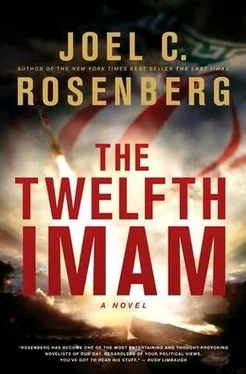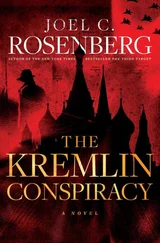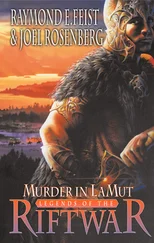ESFAHANI: What?
CALLER: I wish I could tell you, but I can’t. Not on an open line.
ESFAHANI: Give me a hint.
CALLER: I can’t… I…
ESFAHANI: What? What is it?
CALLER: You won’t believe it. It’s miraculous, but…
ESFAHANI: But what?
CALLER: I will tell you more when I see you. But I really have to go. Are you ready?
ESFAHANI: Yes, I’m ready.
CALLER: We need twenty SSPs.
ESFAHANI: Did you say twenty?
CALLER: Yes; two-zero. Twenty.
ESFAHANI: How soon?
CALLER: Yesterday.
ESFAHANI: Why? What’s happening?
CALLER: It’s big, but I can’t say right now. Will call you again when I can.
CALL ENDED AT 0209/21:56:23
“Interesting,” Eva said. “Not every day you read the word miraculous in an intercept.”
“My thought exactly,” Zalinsky said.
“What do you think it means?”
“I have no idea. So let’s start with the more mundane. What’s an SSP?”
“I thought you knew everything, Jack,” she teased.
Zalinsky was in no mood for jocularity. “Just answer the question.”
“I’m guessing they’re referring to secure satellite phones. But why twenty? They need thousands.”
Zalinsky took another sip of black coffee and mulled that for a bit. They both knew that the Iranians had recently bought thousands of satellite phones from a Russian company. The Iranian high command was building an alliance with Moscow and buying billions of dollars’ worth of arms and nuclear technology from the Russians. Why not communications equipment as well? There was just one problem. The Iranians eventually discovered the phones had been tampered with in a way that allowed the FSB, the Russian intelligence services, to monitor their calls. When the bugs were discovered, every Russian-made satellite phone in the country belonging to an Iranian military or intelligence commander had been recalled and destroyed.
The Iranians still had fairly secure landline communications for their military and intelligence organizations, but Iranian officials knew they were vulnerable due to the lack of secure, encrypted mobile communications. This was the very reason the NSA was having success intercepting calls from Esfahani’s cell phone and anyone else’s phone for which Zephyr was able to get a number. It wouldn’t last long. The Iranians had proven themselves incredibly resourceful in the past. But for the moment, the NSA and CIA had caught a break, and they were exploiting it as best they could.
Eva was right. The Iranians needed thousands of secure satellite phones, not twenty.
“Maybe they simply want to test a new supplier and see if they can get a phone the Russians can’t bug,” Zalinsky mused.
“Or maybe they’re setting up a new unit of some kind,” Eva said.
“What kind of unit?”
“Could be anything-suicide bombers, missile operators, something we should be worried about.”
“That’s encouraging,” Zalinsky said. “Okay, then, what’s the Qaleh?”
“It’s Farsi,” Eva said. “It means fortification or walled settlement. But the question is, what do they mean by it?”
“I have no idea,” Zalinsky conceded. “But you’d better find out.”

Tehran, Iran
Waiting for word from Esfahani, David had been going to prayer five times a day, often at the Imam Khomeini Mosque, though not always. He still wasn’t sure what he believed, but he wanted to believe in a God who would hear his prayers. So he prayed for his parents. He prayed for his brothers. He prayed for his country and Zalinsky and the president. He prayed most of all for Marseille. He asked Allah to bless her, to take care of her, to heal her heart and ease her pain. Yet he doubted any of it was getting through. Sometimes there were “coincidences” that seemed like answers to his prayers. But most of the time he still felt he was talking to the ceiling.
When he wasn’t at the mosque maintaining his cover, he went for long walks. He got to know the city. He visited shops that sold mobile phones, asked lots of questions, and then asked some more. Back in the hotel, he tracked business headlines on his laptop. He sent e-mails to colleagues at MDS. Mostly, he reviewed his cover story, again and again, meditating on every tiny fact until it had truly become a part of him.
But he was dying. For too much of the day, he was sitting in a hotel room in the capital of a country feverishly trying to build, buy, or steal nuclear weapons. It was his mission to find a way to stop it, and he was stuck. Alone and out of ideas, he could only wait. He couldn’t talk to Zalinsky. He couldn’t talk to Eva.
The worst part, however, was not the isolation. Or the boredom. Or the feeling of helplessness and frustration at not being able to do more-do anything-to advance his mission, protect his country, and care for his family and friends. The worst part was trying to pretend he was a good Muslim. Deep in his heart, David Shirazi-aka Reza Tabrizi-knew he was not. He believed in God, or at least in some form of divine being in the universe known as “God,” or at least “a god.” He believed this God was a creator, that He had created the heavens and the earth and mankind and him personally. Beyond that, however, he wasn’t sure what he believed.
A shudder ran down his spine. To let such thoughts cross his mind-even if they remained unspoken-was tantamount to apostasy for a Muslim. They were an eternal death sentence, a fast pass to eternal damnation.
Yet how could Islam be true? The purest practitioners of the religion, he reasoned, be they Shia or Sunni, were the ayatollahs and the mullahs. His experiences in Pakistan, Afghanistan, Iran, and elsewhere had taught him that these “holy men” were the most unholy men on the planet. Their minds were filled with thoughts of violence and corruption. The leaders of Iran were the worst of all. They actively denied the Holocaust while planning another. They were trying to obtain weapons capable of incinerating millions upon millions of people in the blink of an eye, and to do so in the name of their god. How could that be right? How could a religion that taught such things be true?
David sat up in bed in the dark.
It was 3:26 in the morning. He had not slept a wink. Three full days and nights had now gone by, and he had still heard nothing from Abdol Esfahani. But he couldn’t stop thinking about a particular line in his rant to his secretary the day David and Eva showed up for breakfast.
“Don’t you know how close we are, you fool?” Esfahani had shouted. “Don’t you know how pious we must be? He’s coming at any moment. We must be ready!”
What did Esfahani mean by that? Who was coming? When? And what did it matter? Why did they have to be ready? Why did they have to be more pious?
Could Esfahani be referring to the coming of the Islamic messiah? On the face of it, it seemed unlikely, David thought. Maybe Esfahani had been talking about an Iran Telecom executive or a board member, or perhaps a top official in the Iranian Revolutionary Guard Corps-a possibility, given that they had just bought a major stake in the company.
Still, David had just gotten an e-mail from Amazon telling him that Dr. Alireza Birjandi’s book, The Imams of History and the Coming of the Messiah, had been shipped to his apartment in Germany. It reminded him of how little he knew about Islamic End Times theology, but he was getting the sense it was becoming a bigger deal in the dynamic of the region than anyone at Langley-Zalinsky included-was considering.
How many Muslims believed the end of the world was at hand? he wondered. How many Iranians did? How many Iranians at the highest levels of the regime believed it?
Читать дальше













